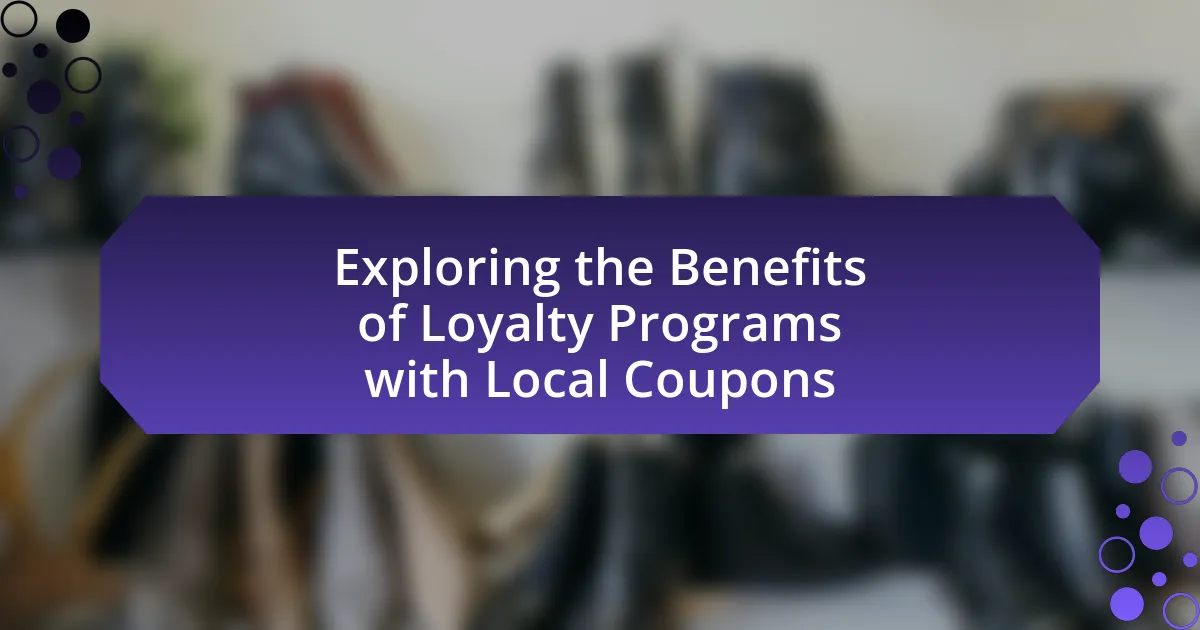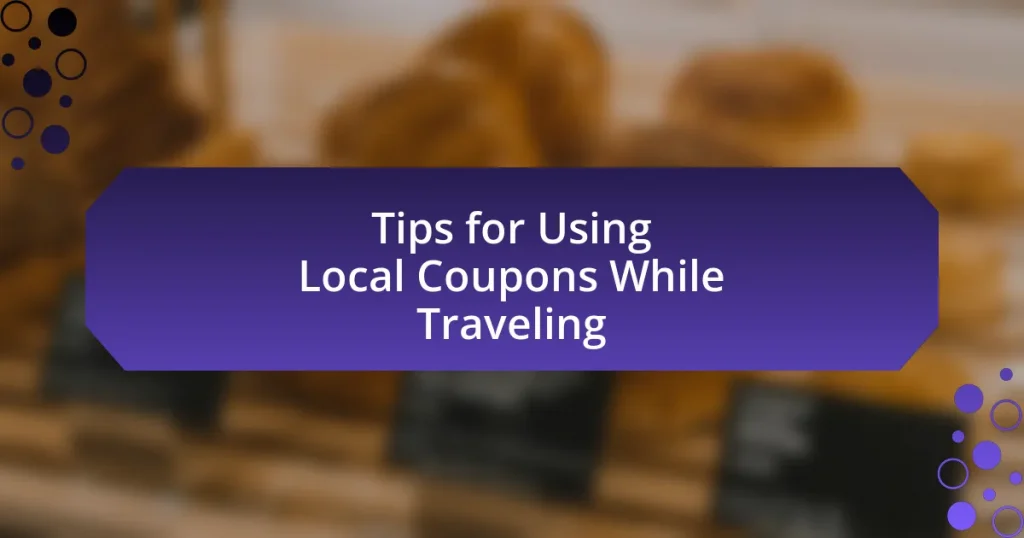Loyalty programs with local coupons are marketing strategies aimed at fostering customer loyalty and increasing sales for local businesses by offering discounts and rewards for repeat purchases. These programs typically feature points accumulation, tiered membership levels, and personalized offers, enhancing customer engagement and retention. Research indicates that loyalty programs significantly improve customer spending habits and retention rates, with consumers more likely to recommend brands that offer such programs. Additionally, local coupons not only provide financial savings but also strengthen community ties by encouraging support for nearby businesses. The article explores the functionality, benefits, and implementation strategies of loyalty programs with local coupons, highlighting their importance for both consumers and local merchants.
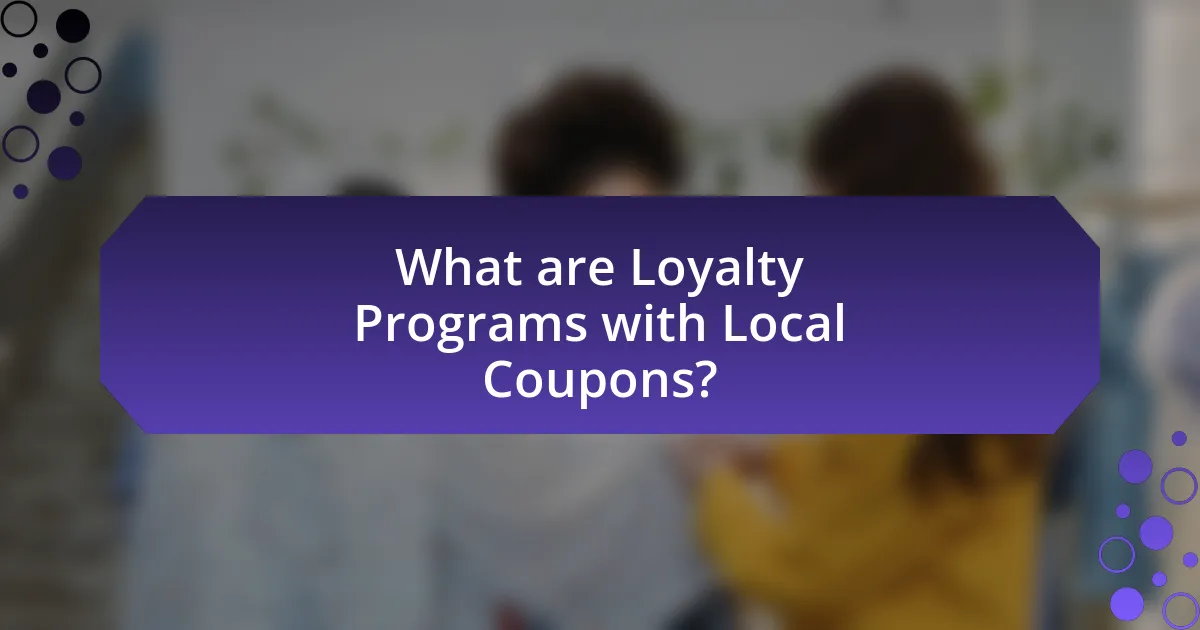
What are Loyalty Programs with Local Coupons?
Loyalty programs with local coupons are marketing strategies designed to encourage repeat business by offering discounts or rewards to customers who frequently shop at local businesses. These programs typically provide customers with coupons that can be redeemed for savings on future purchases, thereby fostering customer loyalty and increasing sales for local merchants. Research indicates that businesses utilizing loyalty programs can see a significant increase in customer retention rates, with studies showing that loyal customers are worth up to ten times their initial purchase.
How do loyalty programs function in local businesses?
Loyalty programs in local businesses function by incentivizing repeat purchases through rewards, discounts, or exclusive offers. These programs typically track customer spending and engagement, allowing businesses to tailor rewards based on individual preferences and behaviors. For instance, a local coffee shop may offer a free drink after a customer purchases ten, encouraging frequent visits. Research indicates that 70% of consumers are more likely to recommend a brand with a good loyalty program, highlighting their effectiveness in fostering customer loyalty and increasing sales.
What are the key features of loyalty programs?
Loyalty programs primarily feature reward systems that incentivize repeat purchases. These programs often include points accumulation, where customers earn points for each purchase that can be redeemed for discounts or free products. Additionally, tiered membership levels are common, providing enhanced benefits as customers reach higher spending thresholds. Exclusive offers and promotions for members further enhance engagement, while personalized communication based on customer preferences increases retention. According to a 2021 study by Bond Brand Loyalty, 79% of consumers are more likely to continue doing business with brands that offer a loyalty program, highlighting the effectiveness of these features in fostering customer loyalty.
How do local coupons enhance loyalty programs?
Local coupons enhance loyalty programs by providing tangible rewards that incentivize repeat purchases. These coupons create a sense of exclusivity and urgency, encouraging customers to engage more frequently with the brand. Research indicates that 70% of consumers are more likely to shop at a business that offers local coupons, demonstrating their effectiveness in driving customer loyalty. Additionally, local coupons can foster community connections, as they often promote nearby businesses, further solidifying customer relationships and enhancing brand loyalty.
Why are loyalty programs important for local businesses?
Loyalty programs are important for local businesses because they enhance customer retention and increase sales. By incentivizing repeat purchases, these programs create a sense of belonging among customers, encouraging them to choose local businesses over competitors. Research indicates that acquiring a new customer can cost five times more than retaining an existing one, highlighting the financial benefits of loyalty initiatives. Additionally, according to a study by Bond Brand Loyalty, 79% of consumers are more likely to continue doing business with brands that offer loyalty programs, demonstrating their effectiveness in fostering long-term relationships.
What impact do loyalty programs have on customer retention?
Loyalty programs significantly enhance customer retention by incentivizing repeat purchases and fostering brand loyalty. Research indicates that customers who participate in loyalty programs are 60% more likely to continue purchasing from a brand compared to non-members. This increased retention is attributed to the perceived value and rewards associated with loyalty programs, which encourage customers to choose a brand over competitors. Additionally, a study by Accenture found that 77% of consumers are more likely to stay loyal to a brand that offers a loyalty program, highlighting the direct correlation between such programs and customer retention rates.
How do loyalty programs influence customer spending habits?
Loyalty programs significantly influence customer spending habits by incentivizing repeat purchases through rewards and discounts. These programs create a sense of belonging and encourage customers to spend more to achieve rewards, leading to increased overall spending. For instance, a study by the Harvard Business Review found that members of loyalty programs typically spend 12-18% more than non-members. Additionally, loyalty programs can enhance customer retention, as consumers are more likely to return to a brand where they feel valued and rewarded, further solidifying their spending habits.
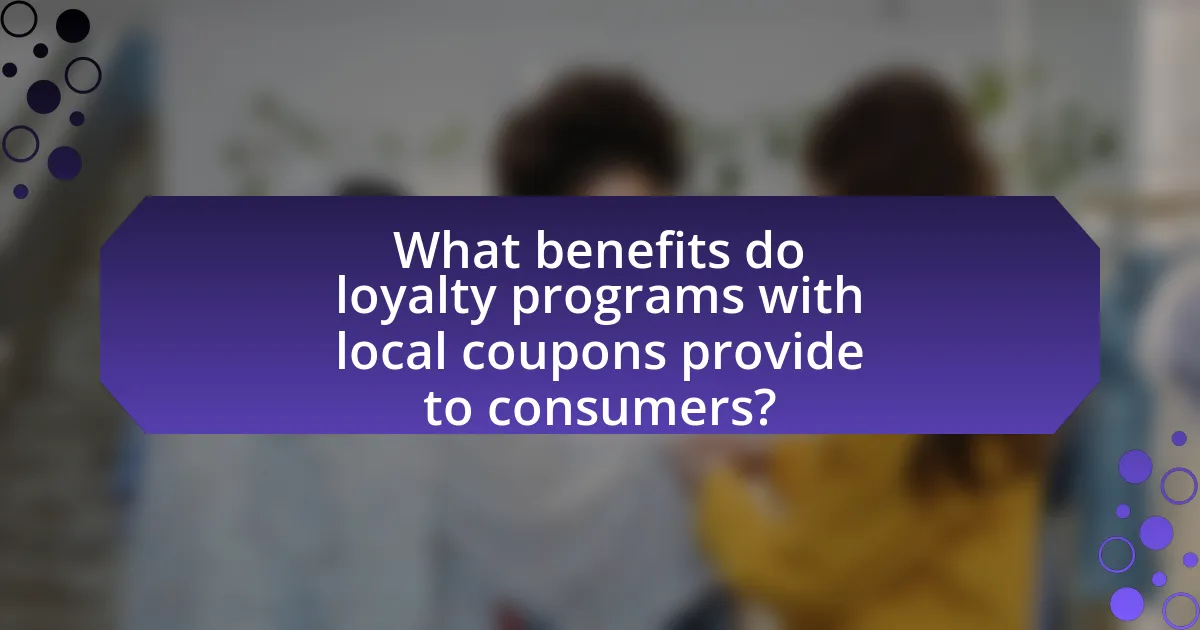
What benefits do loyalty programs with local coupons provide to consumers?
Loyalty programs with local coupons provide consumers with significant savings and enhanced shopping experiences. These programs often offer exclusive discounts that are only available to members, allowing consumers to save money on purchases at local businesses. For instance, a study by the National Retail Federation found that 75% of consumers are more likely to shop at a store that offers a loyalty program, indicating that these programs effectively attract and retain customers. Additionally, loyalty programs can foster a sense of community and connection between consumers and local businesses, as they encourage repeat visits and support for the local economy.
How do these programs enhance customer experience?
Loyalty programs with local coupons enhance customer experience by providing personalized rewards and discounts that cater to individual preferences. These programs foster a sense of belonging and appreciation among customers, as they feel valued through tailored offers. Research indicates that 70% of consumers are more likely to recommend a brand with a good loyalty program, demonstrating the positive impact on customer satisfaction and retention. Additionally, local coupons encourage repeat visits, which not only increases customer engagement but also strengthens community ties, further enriching the overall customer experience.
What types of rewards can customers expect from loyalty programs?
Customers can expect various types of rewards from loyalty programs, including discounts, exclusive offers, points accumulation, and free products or services. Discounts often provide immediate savings on future purchases, while exclusive offers may include early access to sales or special promotions available only to loyalty members. Points accumulation allows customers to earn points for each purchase, which can be redeemed for rewards, enhancing customer retention. Additionally, free products or services, such as complimentary items after a certain number of purchases, incentivize repeat business. These rewards are designed to increase customer loyalty and engagement, ultimately benefiting both the customer and the business.
How do local coupons create a sense of community among consumers?
Local coupons foster a sense of community among consumers by encouraging local shopping and supporting neighborhood businesses. When consumers utilize local coupons, they engage with nearby retailers, which strengthens local economic ties and promotes a shared identity. This interaction often leads to increased social connections, as consumers frequently encounter familiar faces in their local shopping environments. Research indicates that communities with strong local business support experience higher levels of social cohesion and trust among residents, reinforcing the community bond. Additionally, local coupons often highlight community events and initiatives, further integrating consumers into the local culture and enhancing their sense of belonging.
What financial advantages do consumers gain from using local coupons?
Consumers gain significant financial advantages from using local coupons, primarily through direct savings on purchases. Local coupons often provide discounts that can range from 10% to 50% off regular prices, allowing consumers to reduce their overall spending. For example, a study by the Coupon Information Corporation found that 92% of consumers reported using coupons to save money, with an average savings of $1,000 per year for regular coupon users. Additionally, local coupons can encourage consumers to shop at nearby businesses, which may offer exclusive deals not available through national chains, further enhancing savings. This localized approach not only benefits consumers financially but also supports the local economy by driving traffic to small businesses.
How do local coupons contribute to savings over time?
Local coupons contribute to savings over time by providing consumers with immediate discounts on purchases, which can accumulate into significant savings. When individuals consistently use local coupons, they can reduce their overall spending on groceries, dining, and services, leading to a measurable decrease in monthly expenses. For instance, a study by the Coupon Information Corporation found that 92% of consumers reported using coupons, with an average savings of $1,000 annually per household. This consistent use of local coupons not only enhances immediate financial relief but also encourages repeat business at local establishments, fostering community loyalty and potentially leading to additional savings through loyalty rewards.
What are the potential drawbacks of relying on local coupons?
Relying on local coupons can lead to several potential drawbacks, including limited availability and restrictions on usage. Local coupons often have expiration dates, which can pressure consumers to make purchases sooner than they might prefer, potentially leading to impulsive buying decisions. Additionally, these coupons may only be valid at specific locations or for certain products, limiting consumer choices and flexibility. Furthermore, businesses may raise prices to offset the discounts offered through coupons, negating the perceived savings. According to a study by the Journal of Marketing Research, consumers using coupons may also experience lower satisfaction if the perceived value does not meet their expectations, highlighting the risk of disappointment when relying on such promotions.
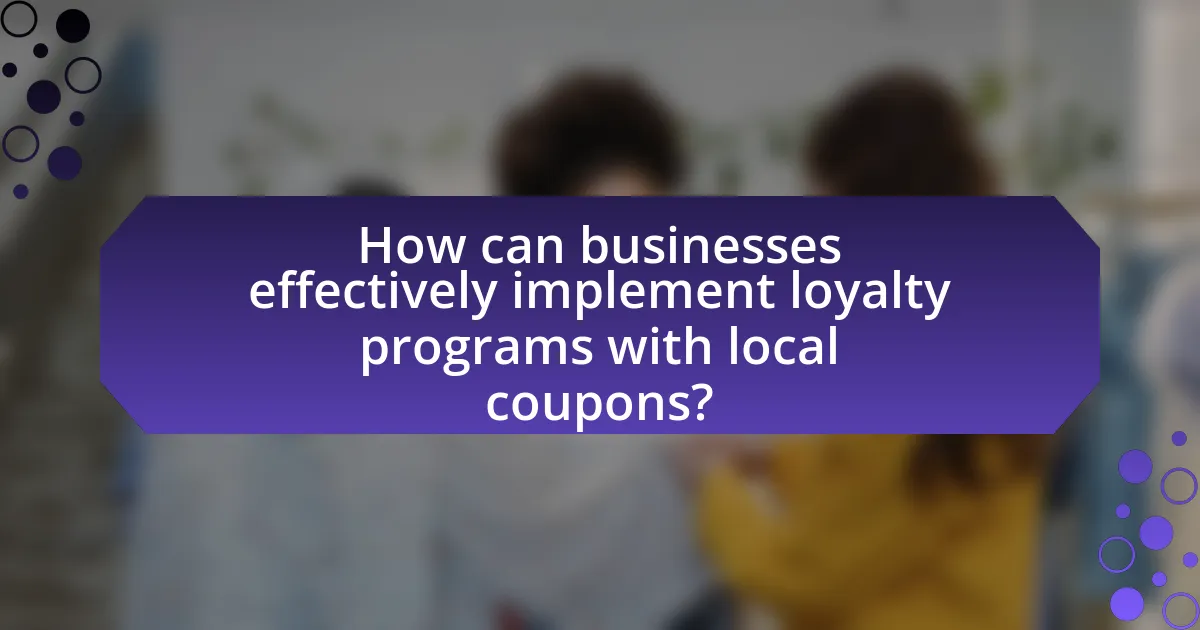
How can businesses effectively implement loyalty programs with local coupons?
Businesses can effectively implement loyalty programs with local coupons by integrating targeted marketing strategies that resonate with their customer base. This involves collecting customer data to understand purchasing behaviors and preferences, which allows businesses to create personalized coupon offers that encourage repeat visits. For instance, a study by the National Retail Federation found that 79% of consumers are more likely to engage with brands that offer personalized experiences. Additionally, businesses should utilize digital platforms to distribute coupons, making them easily accessible and shareable, which can enhance customer engagement and broaden reach. Implementing a tiered rewards system can also incentivize higher spending, as customers are motivated to reach the next level of rewards.
What strategies should businesses consider for successful implementation?
Businesses should consider integrating customer feedback mechanisms as a strategy for successful implementation of loyalty programs with local coupons. This approach allows businesses to understand customer preferences and tailor their offerings accordingly, enhancing customer satisfaction and engagement. Research indicates that companies that actively seek and incorporate customer feedback can increase customer retention rates by up to 15%. Additionally, utilizing data analytics to track customer behavior and coupon redemption patterns can inform more effective marketing strategies, leading to a 20% increase in program participation. By focusing on these strategies, businesses can create a more responsive and appealing loyalty program that drives customer loyalty and sales growth.
How can businesses promote their loyalty programs to attract customers?
Businesses can promote their loyalty programs to attract customers by utilizing targeted marketing strategies such as social media advertising, email campaigns, and in-store promotions. For instance, research indicates that 79% of consumers are more likely to engage with brands that offer personalized promotions, highlighting the effectiveness of tailored communication. Additionally, businesses can leverage local coupons in conjunction with loyalty programs, as studies show that 60% of consumers are motivated to join loyalty programs when they receive immediate rewards or discounts. By integrating these approaches, businesses can effectively enhance customer engagement and drive participation in their loyalty programs.
What technology tools can assist in managing loyalty programs?
Technology tools that can assist in managing loyalty programs include customer relationship management (CRM) systems, loyalty program software, mobile apps, and data analytics platforms. CRM systems like Salesforce enable businesses to track customer interactions and preferences, enhancing personalized marketing efforts. Loyalty program software such as Smile.io or Loyverse allows for the creation and management of reward systems, facilitating customer engagement. Mobile apps provide customers with easy access to their loyalty accounts and rewards, increasing participation. Data analytics platforms, like Google Analytics, help businesses analyze customer behavior and program effectiveness, allowing for data-driven adjustments to improve loyalty initiatives.
What best practices should businesses follow to maximize the effectiveness of loyalty programs?
To maximize the effectiveness of loyalty programs, businesses should focus on personalization, clear communication, and regular evaluation of program performance. Personalization enhances customer engagement by tailoring rewards and offers to individual preferences, which can increase participation rates. Clear communication ensures that customers understand how the program works, the benefits they can receive, and how to redeem rewards, leading to higher satisfaction and retention. Regular evaluation of program performance through metrics such as customer participation rates and redemption rates allows businesses to identify areas for improvement and adapt their strategies accordingly. According to a study by Bond Brand Loyalty, 79% of consumers are more likely to engage with brands that offer personalized experiences, highlighting the importance of these best practices.
How can businesses measure the success of their loyalty programs?
Businesses can measure the success of their loyalty programs through key performance indicators (KPIs) such as customer retention rate, average transaction value, and program participation rate. For instance, a higher customer retention rate indicates that customers are returning due to the loyalty program, while an increase in average transaction value suggests that customers are spending more as a result of incentives. Additionally, tracking the program participation rate helps businesses understand how many customers are actively engaging with the loyalty program. According to a study by Bond Brand Loyalty, 79% of consumers say loyalty programs make them more likely to continue doing business with a brand, highlighting the effectiveness of these programs in driving customer loyalty.
What common mistakes should businesses avoid when creating loyalty programs?
Businesses should avoid creating loyalty programs that lack clear value propositions for customers. A common mistake is failing to align rewards with customer preferences, which can lead to low engagement; for instance, a study by Bond Brand Loyalty found that 77% of consumers are more likely to stay loyal to brands that offer personalized rewards. Additionally, businesses often overlook the importance of simplicity in program structure; complex systems can confuse customers and deter participation. According to research by Accenture, 54% of consumers find loyalty programs too complicated, which negatively impacts their willingness to engage. Lastly, neglecting to promote the program effectively can result in low awareness and participation rates, as highlighted by a report from the Loyalty Research Center, which states that 60% of consumers are unaware of loyalty programs offered by brands they frequent.
What are some practical tips for consumers to maximize their benefits from loyalty programs with local coupons?
To maximize benefits from loyalty programs with local coupons, consumers should regularly review and understand the terms of each program. This includes knowing how points are earned, expiration dates, and any restrictions on coupon usage. Additionally, consumers can benefit by combining local coupons with sales or promotions, which can lead to greater savings. Research indicates that consumers who actively engage with loyalty programs can save an average of 5% to 10% more on their purchases compared to those who do not. Furthermore, signing up for newsletters or notifications from local businesses can provide timely updates on exclusive offers and bonus rewards, enhancing the overall value received from these programs.
